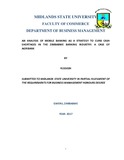Please use this identifier to cite or link to this item:
https://cris.library.msu.ac.zw//handle/11408/3059Full metadata record
| DC Field | Value | Language |
|---|---|---|
| dc.contributor.author | Kufakunesu, Maxwell | - |
| dc.date.accessioned | 2018-05-26T14:10:47Z | - |
| dc.date.available | 2018-05-26T14:10:47Z | - |
| dc.date.issued | 2017 | - |
| dc.identifier.uri | http://hdl.handle.net/11408/3059 | - |
| dc.description.abstract | The research sought to analyse mobile banking as a strategy to curb cash shortages in the Zimbabwe Banking Industry with specific emphasis on Agribank. Banks in Zimbabwe were experiencing cash shortages as evidenced by long queues as well as continuous reduction of daily cash withdrawal limits. Mobile banking is one of the many strategies implemented to curb cash shortages. In August 2016 Agribank introduced mobile banking to its customers. In this research, data was collected through questionnaires completed by one hundred and forty (140) conveniently sampled customers and employees of Agribank in order to investigate customers’ knowledge about mobile banking in Agribank, to identify factors that influence adoption of mobile banking, to determine the relationship between mobile banking adoption and demand for physical cash as well as to determine the causes of cash shortages. The research is an explanatory and cross-sectional study and data was analysed quantitatively through the use of descriptive statistics and qualitatively through thematic analysis. The study unveiled that, customers knowledge about mobile banking was fairly high in Agribank at 63%. All the factors reviewed such as perceived ease of use, perceived usefulness, credibility, self-efficacy, normative pressure, innovativeness and financial cost of mobile service can have an influence on customers’ adoption of mobile banking services. Perceived usefulness and perceived ease of use were proposed by Davis (1989). The research work established that the use of mobile banking reduced customers demand for physical cash thus a negative relationship exists between mobile banking adoption and demand for physical cash. Improvements in wireless technologies and increased uptake of advanced mobile handsets have led to a growing trend in mobile banking activities in Zimbabwe. Mobile banking technology benefited both customers and banks because of its effectiveness in effecting payments, convenience and time saving. It was recommended that banks should deal with security issues and reduce the cost of their mobile banking service to attract more users. The researcher proposes that further research on this topic should not be limited by time and financial resources so that all aspects of mobile banking are sufficiently covered. | en_US |
| dc.language.iso | en | en_US |
| dc.publisher | Midlands State University | en_US |
| dc.subject | Mobile banking | en_US |
| dc.subject | Banking industry | en_US |
| dc.subject | Zimbabwe | en_US |
| dc.title | An analysis of mobile banking as a strategy to curb cash shortages in the Zimbabwe banking industry: a case of Agribank | en_US |
| item.grantfulltext | open | - |
| item.fulltext | With Fulltext | - |
| item.languageiso639-1 | en | - |
| Appears in Collections: | Bachelor Of Commerce Business Management Honours Degree | |
Files in This Item:
| File | Description | Size | Format | |
|---|---|---|---|---|
| KUFA Dissertation.pdf | Full Text | 1.26 MB | Adobe PDF |  View/Open |
Page view(s)
382
checked on Feb 9, 2026
Download(s)
320
checked on Feb 9, 2026
Google ScholarTM
Check
Items in MSUIR are protected by copyright, with all rights reserved, unless otherwise indicated.



